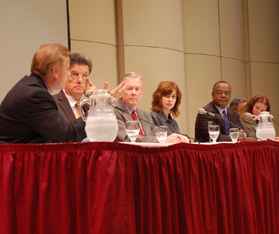The general public is tired of hearing about New Orleans, according to a panel of media professionals.
‘Katrina fatigue,’ as panelist Norman Robinson called it, was discussed in “The Media and Katrina: What Went Right? What Went Wrong?” the second of four planned panels sponsored by the College of Arts and Sciences Faculty Forum and the Loyola First-Year Experience. Seven media professionals spoke to a packed audience in Roussel Performance Hall last Thursday at 7 p.m.
The panelists discussed the country’s fading interest in New Orleans and its future after the storm.
“They have got the idea that Katrina was a form of entertainment. In that respect, the entertainment value is wearing off,” said Larry Lorenz, the A. Louis Read Distinguished Professor in Communications.
Adam Nossiter, a reporter for The New York Times, said that the time that has lapsed since the hurricane is the reason people are disinterested.
“I don’t think that this is a failure of the media. I think that peoples’ attention spans are naturally limited,” Nossiter said.
“The attention that people want to give to things that are unpleasant is also limited,” he said.
The panelists also addressed the reporting of inaccurate information in the days after the storm.
“Those inaccuracies came first from the police chief and the mayor,” said Robinson, an anchor for WDSU-TV.
“At one point we put up the phone number on the air telling [the mayor] to call us. It was a disservice. It was difficult for us to get information. The info we did get was inaccurate,” said Dennis Woltering, anchor for WWL-TV.
Other panelists were quick to give the officials a break.
“I don’t think it was ill-intentioned on the part of city officials. It started up and took a while for anyone to get back to reality,” said Terri Troncale, editorial page editor for The Times-Picayune.
“Yeah, they made some mistakes. I’d have a problem with Geraldo Rivera repeating it two weeks later. Cut them some slack, this only happens once every 40 to 50 years,” said Garland Robinette, host of The Garland Robinette Show on WWL 870 AM and former TV news anchor.
“If this wasn’t war, nothing was,” Robinette said. He broadcasted out of a Hyatt hotel in the days following the storm.
Most agreed that the media failed to prepare for the crisis.
“I think where we failed … was in not being aggressive before the storm. We knew there would be widespread flooding, but somehow we got complacent in that we never pressed our city leaders as to what their plans were. We later came to find out that they had no plans,” Robinson said.
Troncale was not disappointed in the paper’s efforts.
“I believe we’ve been very aggressive in exploring the issues, like insufficiencies in the levee system. We had a very good idea of what could happen under a worst-case scenario … [but] it’s very difficult to comprehend no matter how much info you have,” she said.
The other panelists lauded The Times-Picayune for its post-Katrina coverage.
“If they don’t win a Pulitzer Prize, then it’s fixed,” Robinette said of the newspaper.
“Fairness, balance, objectivity are all there,” Lorenz said. “It’s become much more edgy. It’s become much more personal. It’s become an advocate for us,” he said.
“It’s not so much that we’ve taken a new approach. I think it’s just that we know the story inside out because it is our story as much as it is everyone else’s story in the metro area,” said Troncale.
Robinson agreed that reporters covered the story with more zeal because they were a part of it.
“A lot of us were victims ourselves. I think we’ve become thirstier when we speak about getting to the bottom of an issue. We’ve become even more relentless because the information is crucial and critical,” Robinson said.
“It’s easier to cover a story like this where you are involved and feel an engagement than a story into which you were parachuted from some distant point. You feel that this is not only an important story, but an absolutely necessary story that you care about,” Nossiter said.
Mary Blue, associate professor of communications, also participated in the panel. Nancy Dupont, associate professor of communications, moderated the discussion.
Lisa Campo can be reached at lmcampo@loyno.edu.






